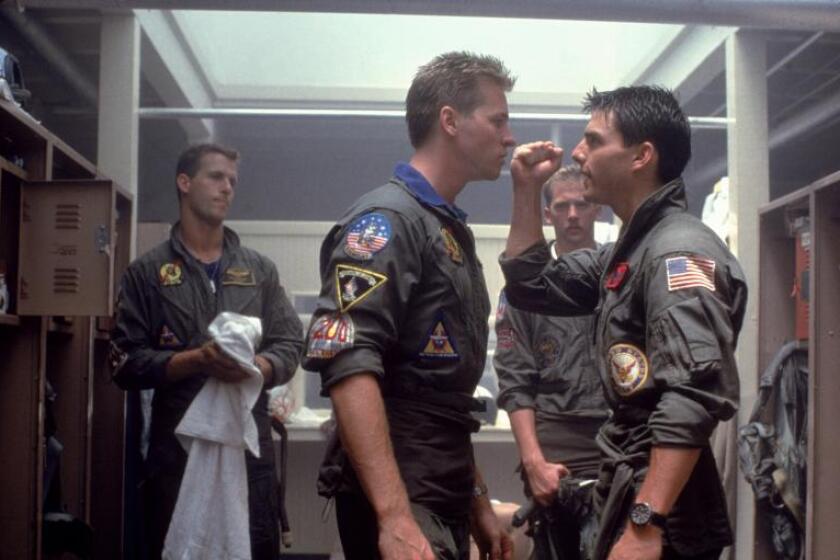Why are so many gifted actresses relegated to ‘wife on the phone’ roles in heroic male movies?
- Share via
In the special skills section of every actress’ resume, she ought to consider adding the phrase “gives good phone.” That’s because even the most gifted women in Hollywood are all too often called on to deliver a prosaic phone scene — worrying about, cheering on, pining for — their men.
This month two variants of the worried phoner are in theaters — Laura Linney as Lorraine in “Sully,” Clint Eastwood’s biographical drama starring Tom Hanks as airline pilot Sully Sullenberger, and Kate Hudson as Felicia in Peter Berg’s thriller “Deepwater Horizon,” starring Mark Wahlberg as an offshore oil rig worker.
Both actresses play their parts with warmth and naturalism. A wary Linney peeks out the window at reporters gathered on her lawn as she begins to grasp the magnitude of her husband’s newfound fame after landing a plane on the Hudson River. A bubbly Hudson shares news of their daughter’s school day over a video call moments before an explosion on the rig.
But the similarities between their dialogue reveal the characters’ limited narrative function, as spokespersons for their spouses’ bravery.
“Sully, watch the news. You’re a hero!” Lorraine tells Hanks’ calm and competent Sully.
“You’re a good man, Mike,” Felicia tells Wahlberg’s calm and competent Mike.
An aw-shucks guy could hardly ask for better publicists.
When actresses dial into the story from outside the action, they’re often there to remind the audience what the hero has to lose, like comfort, family or the love of a good woman who doesn’t seem to own any pants. Or they exist as evidence of a tough guy’s softer side.
But the wife-on-the-phone is rarely written as a fully dimensional character herself.
In true-life stories about male-dominated professions, the wife-on-the-phone trope may be hard to resist. It was, after all, a man who piloted that plane, and it was mostly men who worked on that oil rig, although Gina Rodriguez has a substantial supporting part as a worker on the bridge of the rig.
Other women who have dialed into the action in recent movies include Keira Knightley as the supportive pregnant wife of expedition leader Rob Hall in “Everest” and Sienna Miller as the supportive pregnant wife of Navy SEAL Chris Kyle in “American Sniper,” another highly successful Eastwood film.
The persistence of the device reflects the wider disparity in Hollywood films, where there are two men with speaking roles for every one woman who speaks, according to research by USC’s Media, Diversity & Social Change Initiative. Even when she does speak, a woman is often there to narrate her husband’s journey. In 2015, females made up just 22% of protagonists, according to the Center for the Study of Women in Television & Film at San Diego State University. For every Katniss Everdeen or lady Ghostbuster, there are many, many more women working the phone.
At their worst, phone scenes are a wasteful use of a great actress, like revving up a Maserati just to drive to the corner market. Linney has three Oscar nominations, three Tony nominations and three Emmy Awards. She could probably make a telemarketer look interesting. She also has a deep affection for Eastwood, who cast her in his 2003 mystery “Mystic River” and in his 1997 political thriller “Absolute Power,” and she would clearly play a hero’s wife for him any time.
An actress needs to work, and she may as well work for an icon.
It is possible to make a movie about a heroic man that gives his wife some texture as well — Ava DuVernay’s 2015 historical drama “Selma” is one example. In the role of Martin Luther King’s wife, Coretta, Carmen Ejogo conveys the weight the civil rights movement had on their marriage in a simple look across the dinner table. Publicly she’s the picture of devotion, but privately, she confides her doubts in a friend.
Pablo Larrain’s “Jackie,” a biopic starring Natalie Portman as Jackie Kennedy due in December, forgoes the heroic man altogether, setting its action in the days after President Kennedy’s murder and focusing on the first lady’s mourning and shaping of the Camelot legacy.
As the adult drama has become rarer in Hollywood, giving way to larger-budget, franchisable, kid-friendly fare, well-written women like these have been one of the casualties. Though Hollywood was once driven by the box-office power of actresses, in film noir, screwball comedies and dramas, women who want to play layered characters on a big screen have fewer choices today, and many have migrated to television instead.
And if the cinematic equivalent of “I just called to say I love you” is what awaits them in movies, who could blame them?
See the most-read stories in Entertainment this hour »
Follow me on Twitter for more movie news: @thatrebecca
ALSO:
More to Read
Only good movies
Get the Indie Focus newsletter, Mark Olsen's weekly guide to the world of cinema.
You may occasionally receive promotional content from the Los Angeles Times.











